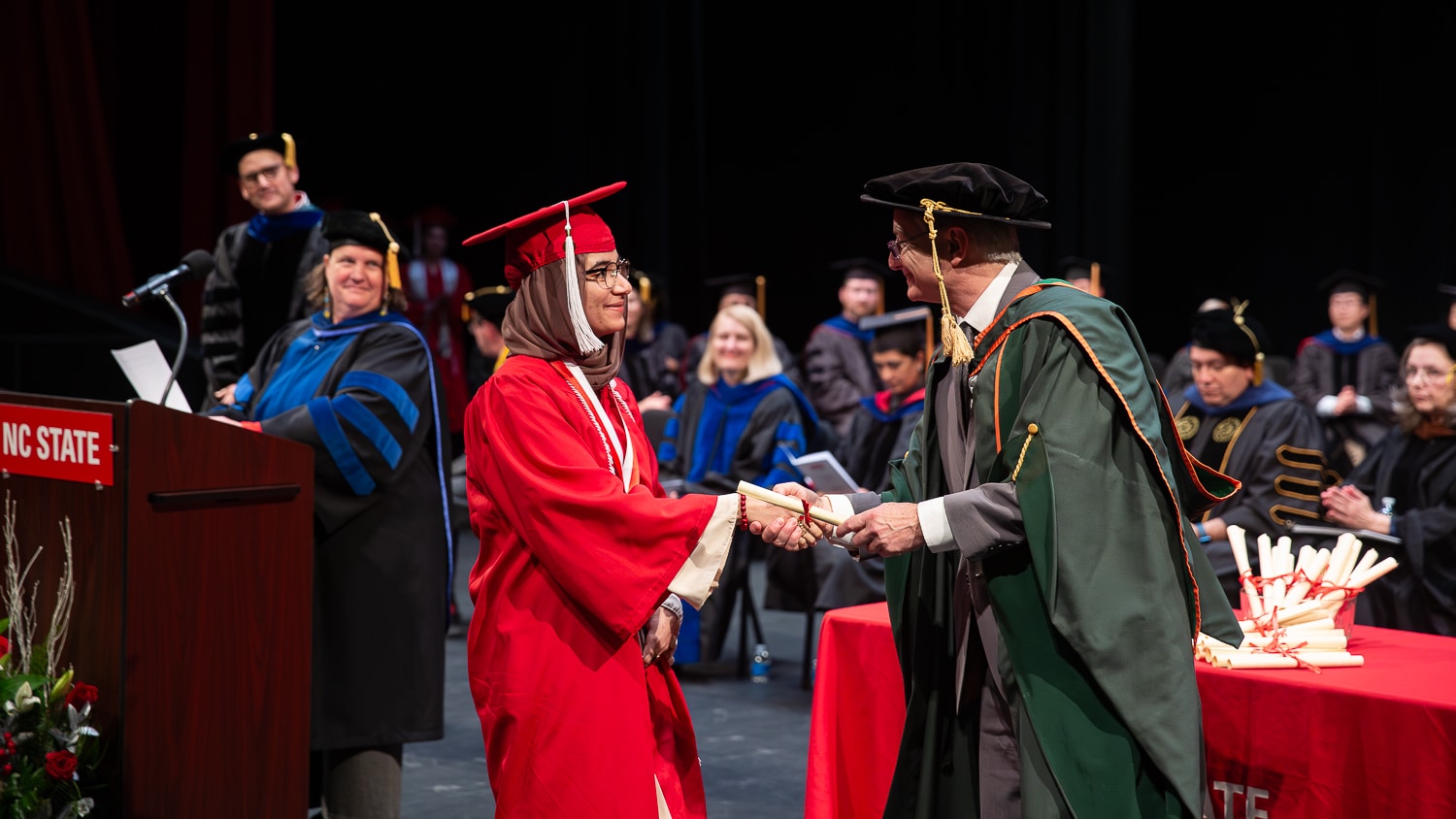A Legacy of Success

By Alyson Tuck
Since Samuel Walker first founded the Virginia Underwear Corporation in 1928, the Walker family’s business has been a success story for their family, for their hometown of Martinsville, V.A., and for NC State. Their family legacy — one mixed with education, hard work, tragedy, luck and success — is a proud component of NC State’s legacy of developing leaders across the textile field.
Laying a Solid Foundation

When Sam Walker enrolled in the Textiles department at NC State (then called North Carolina College of Agriculture and Mechanic Arts) in 1915, he was preparing to one day run the Martinsville Cotton Mill, his family’s business. Though Sam was the youngest of his three brothers, his father, Robert L. Walker, felt that he was the one to take over the mill. But first, Sam decided to get a formal textile education, a unique opportunity for a young man of his generation. He ventured south from the rolling hills of southwest Virginia and headed to NC State, which boasted the largest program in the country in cotton manufacturing.
Dudley Walker still remembers the stories his father told him about his college days, when the study of textiles at NC State was in its infancy. Sam told tales about his classes with NC State Textiles pioneer Thomas “T Foot” Nelson the newly rebuilt Tompkins Hall. He spoke of dark days on campus during the Spanish influenza outbreak when he fell terribly ill, was placed in the infirmary and watched the student on the cot next to him pass away. When World War I broke out, the ROTC was replaced by the Student Army Training Corps (SATC), where Sam served with fellow students in serious military training. And in lighter moments, Sam cheered the Wolfpack football team in Riddick Stadium and presided over gatherings of his Pi Kappa Alpha fraternity brothers.
Sam Walker was one of ten men to graduate from the Textiles department in 1919, heading out into the world trained in cutting-edge textile practices. He stuck with his plan, immediately returning to the increasingly successful Martinsville Cotton Mill, which produced cotton sheeting. As foreman of the spinning room, he applied his education, while learning the family business from his father.
Three months after graduation, tragedy struck. Sam’s father was helping move the company into a new building when he tried to help steady the office safe as it started to fall. It fell upon him, killing him. The Walker family sold their holdings in the cotton mill, and at age 23, Sam found himself educated, unemployed and at loose ends.
It took a while for Sam Walker to get back on his feet, but when he did, he thrived. After years of working odd jobs in other family businesses, Sam befriended W.L. Pannill, who had just moved to Martinsville to start Pannill Knitting Company, which produced men’s long underwear. Pannill took a shine to this eager young man with extraordinary textile training and took him under his wing. As his mentor, Pannill helped Samuel establish a knitting company, right next door to his own, that produced children’s underwear. In 1928, resourcefully operating on second-hand knitting machines, sewing machines and dye tubs from a recently bankrupt company, the Virginia Underwear Corporation was born.
Under Sam’s leadership, Virginia Underwear Corporation soared, producing underwear and children’s sleepwear, called Snoozers, that were sold nationwide. Even during the Great Depression, Virginia Underwear Corp. was increasingly profitable, providing more and more jobs for members of the Martinsville community. Their product was inexpensive, Dudley Walker explained, and even during the toughest of times people would afford to buy their children new underwear.
Maturing the Family Business

Like his father, Dudley Walker was born into the textile business, and like his father, he planned for a future in textiles from an early age. A critical step in that plan was getting a strong textile education. For Dudley, there was only one place to consider: NC State.
Dudley Walker arrived on campus in 1948 to a university adjusting to post-war life. He remembers Reynolds Coliseum — where he spent his later college years rooting for the men’s basketball team — as a skeleton of steel beams, halted for the war effort. The physical landscape had changed significantly since his father’s time there, but the textiles program, now School of Textiles (and today the Wilson College of Textiles), was stronger than ever. Dudley threw himself into his studies, learning all he could about yarn manufacturing, weaving, textile management, textile chemistry and dyeing fabrics — knowledge that would serve him well in years to come. A leader like his father, he excelled in ROTC and was president of the Pi Kappa Alpha fraternity. Dudley graduated with a degree in Textile Management in 1952.
After two years in the Army, Dudley returned home to Martinsville to work in his father’s flourishing business. By this point, Sam Walker was president of two textile companies: Walker Knitting Company (formerly Virginia Underwear Corp.) and Bassett-Walker Knitting Company. In addition to underwear, they had begun to manufacture sweatshirt and sweatpants, at a time when these items were just beginning to skyrocket in popularity for athletes. In 1957, Dudley became president of Walker Knitting Company. Just three years later, Sam Walker died suddenly, leaving Dudley at the helm at just 30 years old.
Following his father’s example, Dudley Walker pulled success from family tragedy. In 1964, he merged the Walker’s two companies into one, which retained the name Bassett-Walker Knitting Company. When the fitness craze hit the United States, Bassett-Walker was poised to profit. Trying to keep up with demand for fleece sweatshirts and sweatpants, they expanded their facilities time and time again throughout the 1970s. When the Martinsville area couldn’t provide enough labor to match their growth, they opened satellite facilities in neighboring areas, bringing jobs and boosting local economies. At the height of Dudley’s operation, Bassett-Walker owned 13 plants and employed more than 7,000 workers. Bassett-Walker had sales offices from New York to Los Angeles, and Martinsville became known as the Sweatshirt Capital of the World.
Dudley Walker faced an easy decision when VF Corporation offered to buy Bassett-Walker in 1984. He remained president for two years after the sale, then retired in Martinsville with his wife. Looking back at the tremendous rise of his company, Dudley explained that he never imagined that things would turn out as well as they did. Humbly and matter-of-factly, he described the source of his success.
“There’s no secret,” Dudley Walker said. “The demand was there and we made a good product. It was something that people wanted and they could afford. It was an excellent market. We just happened to hit a good market at a good time.”
Some may say Sam and Dudley Walker were lucky in business, but as the saying goes, luck is what happens when preparation meets opportunity.
- Categories:


